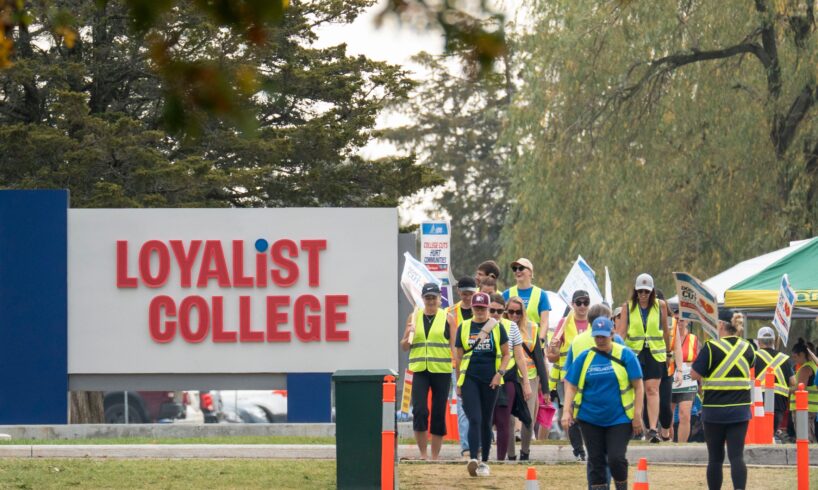
Open this photo in gallery:
College support faculty from the Ontario Public Service Employees Union picket at Loyalist College in Belleville. The college is facing financial difficulties due to the reduction in international student enrolment, heating up labour negotiations between OPSEU and the College Employer Council.David LeClair/The Globe and Mail
Two Ontario colleges are facing significant financial hardship if they do not slash costs to cope with weaker foreign student enrolment, according to reports prepared for the Ontario government.
Loyalist College in Belleville and Northern College in Timmins could suffer revenue declines of approximately 60 per cent and 35 per cent, respectively, between 2025 and 2030, according to the reports, which were authored by consulting companies KPMG and Deloitte and obtained by The Globe and Mail.
The drop in revenue would largely be driven by a sharp reduction in international student enrolment, which is already affecting the finances of postsecondary schools across the country. Starting in 2024, the federal government has capped the number of student visas that it issues, part of broader efforts to restrain population growth after years of torrid expansion and concerns about housing costs.
The consulting companies recommended that both colleges cut staff, suspend programs that were filled primarily by foreign students and sell assets, such as buildings, to generate a one-time cash infusion. The colleges are already implementing some of these cost-cutting measures, to an extent.
Auditor-General plans probe of international student program
The KPMG report on Northern College projects that the institution could run an $8-million deficit by 2030, a reversal from an $8-million surplus in the fiscal year ending March 31, 2025. Northern could be in a surplus position by 2030 if it makes specific recommended changes to programs and staffing numbers.
The Deloitte report on Loyalist College projects that its deficit could climb to $41-million from $28-million over five years without certain program cuts and staffing reductions. Even with those cuts, the college is projected to be in a deficit position of almost $30-million by 2030.
The college’s public financial statements for 2024-25 had warned that it could run out of cash by next March without an extra $25-million in provincial funding.
The consultant reports were prepared this past spring for Ontario’s Ministry of Colleges, Universities, Research Excellence and Security, part of a three-year initiative to identify actions that postsecondary institutions can take to drive long-term cost savings.
At least 14 public colleges have undergone a consultant review, according to documents obtained by The Globe. They include Durham College in Oshawa, Fanshawe College in London and Sault College in Sault Ste. Marie. All of these colleges have attracted scores of international students over the years.
In a statement, Northern College’s executive director of marketing, communications, and external relations, Jaret Dicks, said that there has been a significant decline in applications of international students to the college, but it was too early to gauge the extent of the financial impact compared with prior years. Loyalist College did not respond to questions from The Globe about its financial state.
Open this photo in gallery:
The union says almost 10,000 college faculty and staff have either been let go in the last year, or are projected to lose their jobs because of the drop in international student enrolment.David LeClair/The Globe and Mail
Ontario colleges are especially vulnerable to the student-visa limit because they had relied on soaring numbers of international students to juice their finances. Provincial funding for public colleges and universities has been on the decline for the past 10 years, and a tuition fee freeze for domestic students that began in 2019 forced these institutions to seek other sources of revenue.
Student permit approvals plummeted by 70 per cent in the first half of 2025, compared with the first half of 2024, with 90,000 fewer international student visas being issued, according to data from Immigration, Refugees and Citizenship Canada. As a result, many Ontario colleges are already cutting programs and laying off staff.
An arbitrated contract between the Ontario Public Service Employees Union (OPSEU) and the College Employer Council made public in July also shows how dramatically the decline in international students has affected public colleges, with 23 out of 24 institutions reporting a 48-per-cent decrease in first-semester enrolment of international students between September, 2023, and September, 2024.
Northern College is a remote community college system, with campuses across four Northern Ontario communities: Timmins, Haileybury, Kirkland Lake and Moosonee. Before the federal government slashed foreign student visas, international students made up 60 per cent of Northern’s full-time student body.
In the 2023-24 fiscal year, international student fees generated almost $30-million in revenue for Northern, according to the KPMG report, which runs more than 200 pages. The consultant projects this revenue source will plummet to $8.6-million by 2027-28. International student fees also cover the operating costs of many programs that are loss-makers, according to KPMG.
International students are being set up to fail
Business programs at Northern College were driving its financial growth. In 2024, roughly half of all international students at the college were enrolled in business programs. But under new federal rules put in place in November, 2024, non-degree business programs became ineligible for postgraduation work permits (PGWP), disincentivizing international students from enrolling in these courses. After the rule change, only 40 per cent of programs that Northern was offering were PGWP-eligible, drastically altering its financial picture.
For years, international students have enrolled in two-year programs that led to three-year work visas, with the ultimate goal of securing permanent residency during that timeframe.
At Loyalist College, a similar situation has played out. In the 2023-24 academic year, international students accounted for 84 per cent of enrolment in business programs. But the college has cancelled several of those programs starting this month, because they are no longer eligible for work permits. In total, the college has suspended 24 academic programs, and cut its work force by 20 per cent. It also shut down its Toronto campus this past summer.
The Deloitte report on Loyalist said that those academic program cuts and layoffs could immediately generate $26-million in savings. It also recommended additional cuts to programs and staff over the coming year.
KPMG, too, has suggested slashing programs at Northern College that are no longer PGWP-eligible and as such, have low domestic enrolments rates. Twenty-five of Northern’s 48 programs in the 2024 academic year were in the “low enrolment” category, including its veterinary sciences program.
Premiers push for more power over immigration as Ford takes aim at federal minister
KPMG also suggested that Northern consider leasing or selling its Kirkland Lake and Moosonee campuses, which could generate $1.3-million in savings from a reduction in operational costs. In 2024, Kirkland Lake’s international student population was about 55 per cent of the overall student population at that campus.
Ontario colleges have been chronically underfunded by the provincial government for decades, according to Alex Usher, president of Higher Education Strategy Associates, a Toronto-based consulting company. “You can understand why Northern expanded its student base with international students.”
Mr. Usher said that many public colleges which expanded in size over the past five years because of international student revenue will end up struggling. “It will not happen in one year because they packed away some surpluses and that will cushion the blow. But eventually they will get back to the point where they do not have enough money to do the job the government has given to them.”
The financial state of Ontario’s public colleges, and subsequent layoffs, have heated up labour negotiations between OPSEU and the College Employer Council (CEC), which represents all 24 of the province’s public colleges. According to OPSEU, close to 10,000 college faculty and staff have either been let go in the last year, or are projected to lose their jobs as a result of the sudden drop in international student enrolment.
Last week, thousands of full-time college support staff went on strike, asking colleges to guarantee that there will be no further layoffs and no campus or college closings for the next three years. The CEC has said that OPSEU’s demands are unreasonable.





